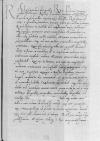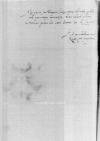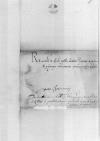Relatum est nobis a quibusdam hominibus, quorum fidem perspectam habemus
, repullulascere in ⌊civitate nostra Gedanensi⌋ novas factiones atque haereses, prosperis rerum successibus et hominibus pariter atque fortunis aucta civitate, et animis quorundam insolescentibus atque ad eam pestem exorientem magistratus conivere. Quin esse plerosque inter eos, qui post discessum illinc nostrum in senatum et in consessum iudicum seu scabinorum cooptati, nullum etiamnum ius iurandum nobis praestiterint. Quae res in tempore non provisae magnorum malorum seminarium esse possent. Itaque iniungimus Strenuitati Tuae, ut cum magnifico ⌊Georgio a Baysen⌋ palatino Marienburgensi constituto die conveniat et consultatione matura et accurata habita ⌊Gedanum⌋ descendat atque illic mandata nostra secundum commissionem, quam ea de re ad Strenuitates Vestras mittimus, diligenter exsequatur provideatque diligenter, ut civitas illa [...] paper damaged⌈[...][...] paper damaged⌉ statu atque ordine consti paper damaged⌈[sti]sti paper damaged⌉tuta, non solum ab illis ipsis malis, quae iam percensuimus, verum etiam ab ipsorum malorum suspicione, quoad eius fieri potest, libera sit et immunis. Erit hoc nobis longe gratissimum et officio fideique Strenuitatis Tuae congruentissimum.  BNW, BOZ, 953, f. 124v Nos porro suo tempore huius operae collocatae gratia nostra non erimus immemores.
BNW, BOZ, 953, f. 124v Nos porro suo tempore huius operae collocatae gratia nostra non erimus immemores.
Bene valeat Strenuitas Tua.
 BNW, BOZ, 953, f. 124v Nos porro suo tempore huius operae collocatae gratia nostra non erimus immemores.
BNW, BOZ, 953, f. 124v Nos porro suo tempore huius operae collocatae gratia nostra non erimus immemores.

